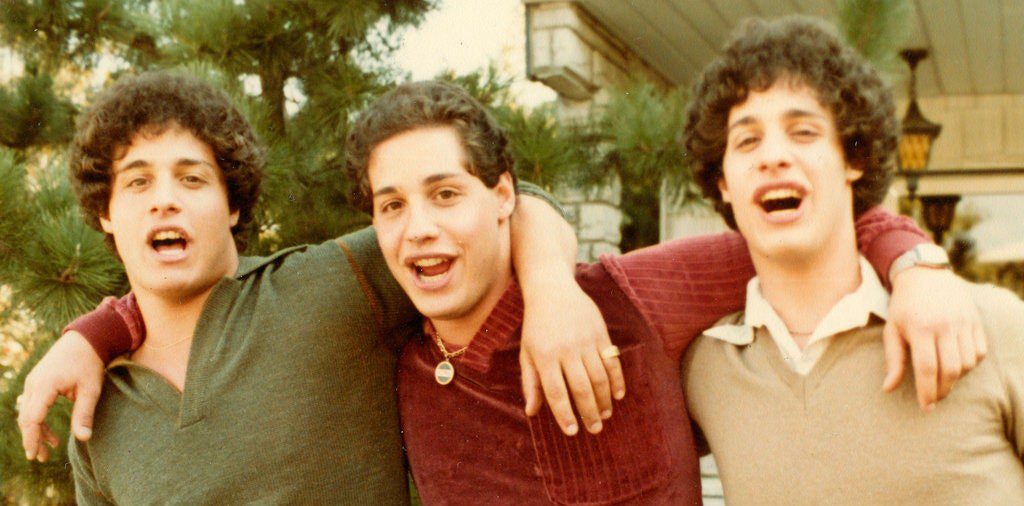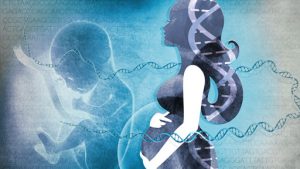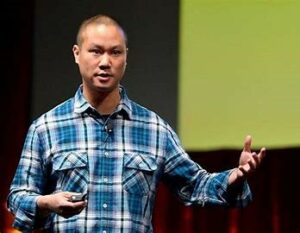Imagine moving into your dorm for the first time, and as you’re trying to get everything settled, several people you’ve never met greet you and call you by an unfamiliar name. Then suddenly somebody screams out that you have a twin. Well, as strange as that is, this exact scenario happened to Bobby Shafran in 1980. Bobby was moving into his dorm and was unfamiliar with the people at Sullivan Community College, in New York, but many of them greeted him and welcomed him back. However, things got strange when they began to call him “Eddy.” After much confusion, Michael, Eddy’s best friend, stepped in and began to ask him if he was adopted, and convinced him to drive to Eddy’s house. Upon arrival, the two long-lost brothers immediately conversed and hugged as if they had known each other their whole lives. Soon the story hit the New York Times, and everybody was in shock with the impossible situation.1 The story was incredibly hard to believe at the time, and it only got more confusing when David Kellman looked down at the newspaper and realized that he was staring down at two of himself. Immediately he called the other families and soon the three boys were reunited. The three families were so caught up with what seemed like a miracle that it was long until they questioned how these three boys got separated at birth back in 1961 by the Louise Wise Adoption Agency.2

Bobby, David, and Eddy at first weren’t occupied in finding out why the agency would separate them. On the other hand, their parents wanted to find out why, so all three families arranged a meeting with those working for the Louise Wise Adoption Agency. The meeting concluded nothing, as the agency only excused the incident by saying that they didn’t believe that a family would take in all three twins. With this simplistic answer, the three brothers continued to flourish in their new fame and seized every opportunity to be together. The boys quickly began to learn how similar their interests were and with the explosion of this news, many shows called them in for live interviews. Everybody was curious about them. They were asked if they had similar taste in food, cars, women, and mannerisms, to which they all answered yes. Bobby, David, and Eddy shared personality traits that amazed all the people watching them on television. In several interviews they revealed how all three had participated in wrestling in junior high and even smoked the same brand of cigarettes.3
When looking at triplets, the genetic makeup is distinctly different from regular siblings and fraternal twins. While fraternal twins only share fifty percent of their DNA code, triplets share one-hundred percent of their DNA code with each other. Identical twins are formed from the exact sperm and egg sharing the same DNA code that predisposes them to a lot of their psychical traits.4

In different studies, twins have been proven to be quite similar in both physical and personality traits. Psychologists had believed that this was due to twins being exposed to the same environment, allowing them to develop quite similarly. However, both nature and nurture contribute factors that predispose people to their personality. While nature deals with genetics, nurture focuses on environmental factors as impacts to one’s self. In this specific case, the triplets realized that heredity was influencing their personality. This can answer why Bobby, Eddy, and David looked exactly alike physically, but also shared many of the same interests, thoughts, mannerisms, and ideas. The idea of nurture was of little influence in this case, because the three brothers were identical in personality regardless of the different environments they were placed in at birth.5
Eddy, Bobby, and David had become so involved in each other’s lives, that they decided to open a restaurant called “Triplets” in New York. The brothers even decided to get an apartment together to make up for lost time. They had been getting along so well, and this only created a stronger bond between the three brothers. What used to be a dream quickly turned into a nightmare for the three men as they started to work together. As time passed, the three brother’s work ethics conflicted and they often had similar ideas for the restaurant. They recognized that not growing up together caused them to be unable to adjust to one another. After a lot of conflict, Bobby Shafran decided to leave the business, which caused a divide between the families. The three brothers eventually got married and Eddy relocated to stay near Bobby and David several times. However, the families we’re not as close, with only Eddy and David running the restaurant. Eddy began to act strange and revealed erratic behaviors, and he was admitted to a psychiatric ward. However, Eddy’s bipolar disorder only worsen, and he committed suicide in 1995. This event reveal that all three had once been admitted for psychiatric help, and it made them question more about the circumstances that had surrounded their birth.6
Eddy’s tragic death only fueled Bobby and David more to reach out to the Louise Wise Adoption Agency to figure out why they had been split up. The head psychiatrist Dr. Peter worked for the Louise Wise Adoption Agency and purposefully orchestrated the separation of not only these three brothers, but other set of twins as well. Dr. Peter oversaw a study on Nature vs Nurture in twins, and gathered several assistants to help conduct it.7 Although many records weren’t released, Bobby had gotten in contact with the assistants in the experiment after many attempts to receive the documents that were sealed off in Yale University. Lawrence Perlman, Dr. Peter’s assistant, revealed that the agency had tried to see the impact of the differences in parenting and in social class on twin personalities. Dr. Peter placed Bobby with a wealthy family, Eddy with a middle class family, and David with a blue-collar family. The research assistants had gone to their homes as they grew up to test what heritable traits they shared in their controlled environments. Dr. Peter’s assistants would also test the boys’ intelligence, emotions, and picture descriptions, and as they grew older, the examinations would become more complex. They had also chosen them carefully to all live within a hundred-mile radius from each other in order to follow up with the children for several years. The study made Bobby and David feel like guinea pigs, and it crossed a lot of personal boundaries that should have been illegal at the time. The assistants disagreed, because at the time the boundaries for scientific research were not greatly restricted.8

Although psychology had been a respectable discipline since the nineteenth century, Social Psychology was coming into its own in the late 1950s and early 1960s. Many psychologists had conducted experiments regarding human nature and the factors that influence personality. At that time, researchers still didn’t have regulations for their experiments. Over time, the American Psychological Association (APA) has established limits and preventions to avoid unethical experiments after continuous disregard for participant awareness.9 The APA’s ethical guidelines mentions debriefing, which is the first step a researcher must take before he or she can construct experimental groups. Debriefing consists of researchers explaining the nature of their experiment to the participants and then allowing them to choose whether they wish to remain a part of the experiment. After the debriefing process, it is also required that researchers explain the confidentiality of the experiment and the role the participants will take. Once the research is conducted, participants get called in to discuss the results or any deceiving, if any, that took place during the experiment.10
The era when the three brothers were born was a time when scientific research in social psychology was still in its unmonitored and undisciplined stage. The assistants in the research conducted by Dr. Peter didn’t feel regret for what they had participated in, even though they later admitted that it was unethical. There was a lot to uncover about the impact of genetics on personality that was tested without much ethical control during the 1950s and 1960s. Overall, the study had concluded that genetics played a huge role on the development of the three brothers, and that mental illness can also be inherited and displayed, regardless of parental involvement or social class. This was one of many experiments that paved the way for the APA’s implementations of ethic standards for scientific experiments.11 But Bobby, David, and Eddy felt used and didn’t accept the excuse for their treatment. Their whole lives were treated as a huge experiment, and it was only a mere coincidence that the three brothers had crossed paths in 1980. After Eddy’s passing, Bobby and David were able to find closure by receiving all the documents from the agency over the experiment. Bobby and David continued their life’s alongside their families after all the tragic news, but later agreed to make a documentary to bring awareness to the issue.
- Emma Shackle, “Three Identical Strangers,” Transpersonal psychology review, (2019): 58-59. ↵
- Leon Hoffman, “Three Identical Strangers and The Twinning Reaction,” The Arts and Medicine, (2019): 10-12. ↵
- Emma Shackle, “Three Identical Strangers,” Transpersonal psychology review, (2019): 58-59. ↵
- Bryanna Moore, “The Strange Tale of Three identical Strangers: Cinematic Lessons in Bioethics,” The Hastings Center Report, (2019): 21. ↵
- Victoria Stern, “Roundup: Nature vs Nurture,” Scientific American Mind, (2014): 73. ↵
- Charlie Brouillard, “Predictive Links Between Genetic Vulnerability to Depression and Trajectories of Warmth and Conflict in the Mother-Adolescent and Father-Adolescent Relationships,” Developmental Psychology, (2019): 1743-1746. ↵
- Emma Shackle, “Three Identical Strangers,” Transpersonal psychology review, (2019): 58-59. ↵
- Leon Hoffman, “Three Identical Strangers and The Twinning Reaction,” The Arts and Medicine, (2019): 10-12. ↵
- Franklin Miller, “Forgoing Debriefing in Deceptive Research: is it ever ethical?” Ethics and Behavior, (2013): 105. ↵
- Malgorzata Oczak, “Debriefing in Deceptive Research: A Proposed New Procedure,” The Journal of Empirical Research on Human Research Ethics: An International Journal, (2007): 49-59. ↵
- Malgorzata Oczak, “Debriefing in Deceptive Research: A Proposed New Procedure,” The Journal of Empirical Research on Human Research Ethics: An International Journal, (2007): 49-59. ↵



71 comments
Andrea Degollado
I had never heard about this case prior to reading this article.I think splitting these triplets up as an experiment was unethical. They split up a family, as it was they were up for adoption they had each other and even that was taken away for a simple experiment. I think the suicide of one of the brothers was something that could have been prevented, maybe if they had stuck together, they could’ve cured him or found a solution a lot sooner.
Thiffany Yeupell
When the pursuit of knowledge is left unattended and is bound by no ethical standards, such results can be similar to that of the triplet’s case. It is asinine to think that such an experiment could be conducted without remorse or any fallbacks, to help the individuals involved after it has been completed, but the environment surrounding research was a different era with different guidelines. It is only through trial and error that we happen upon these regulations to better protect individuals who become subjects of such studies. As much as we would like to deny, the regulations and guidelines surrounding the research conducted today are often reactionary.
Anthony Coronado
I do believe that your actions as a professional scientist or health official career can still be reputable to consequences in the evaluation of patients who are unaware of the study. It is the same concept with finding loopholes to being unaware of their participation in a trial study, to produce scientific results that they did not agree on. While I do believe the results were unethically produced I do believe these results are a solidified scientific trials with a saddened outcome of the triplets.
Estefanie Santiago Roman
I feel like I have heard about similar experiments being done on kids and twins, but this article made me think of the triplets biological parents and whether they knew and gave consent for this experiment to happen. Sometimes it is hard to believe what things are done just for the name of science. Although some of them would not be considered unethical due to the people being able to make a choice of their own. It is sad to see that sometimes we have experience and go through something like this, so in the future we are able to make changes for the better.
Davis Nickle
This was a happy story turned tragic, and I was really upset by the separation and experimentation that happened to these brothers. I think that there should always be consent when considering experiments on humans and the fact that they did this to these guys without their knowledge is really just awful. I hope Bobby and David can find peace with their brother’s passing.
Francisco Cruzado
I liked the article’s pace, specially the smooth and engaging beginning, it described three lives in a simple but very solid manner. It sounds horrible that one’s life may be turned into an experiment during the middle-1900s in the US, but it also seems like a first realization of science on the controversial and heated debate that surrounds human experimentation. I do wonder all the stress that might have gone around the head of the triplet who committed suicide, the confusion, the anger, the loneliness, or just the questions that rise when you discover that your life is a mystery or that there could be something wrong with you since long ago.
Arsema Abera
This was a sad article. It displays how human beings are inconsiderate towards the feelings of others. Just for the sake of research they had to jeopardize the mentality of the triplets, this shows how much the so-called “Scientists” should be questioned for their actions, what made this even a sadder story is that there was no justice for this unethical behavior and it’s unfortunate that the triplets had to go through these traumatic events.
Yuliana Vasquez
This was such a sad story to read especially knowing that they separated them just to conduct an experiment is just so unfair. Especially that they later found out and then were faced with one of the brothers committing suicide. The worse part of them all is that nothing was really done, that questions were asked but they only received such vague answers after trying to search for them for a while.
Giselle Garcia
Hearing about this unethical study on triplets is unfortunate because no one should have to go through this invasion of personal boundaries. It’s also disappointing that there was no justice for the triplets after what they have been through. Besides the study, I am relieved that the triplets all reunited and were able to know each other. It is interesting to learn about how they still had similar personalities and likes even though they were raised separately as a result of their genetics.
Ivonne Martinez
I had heard about this case before. The thing that bothers me so much, and many others as I read on your article, is that there was no justice for what happened to the triplets. The unethical aspect of it is that the research conducted on those triplets and the other twins is still being used for further research. I believe that, even if there was no rules for how to conduct research back then. there should be some kind of repercussion for the amount of trauma was passed to the people the experiment was conducted on. I also believe that since the data collected from the unethical experiment was also unethical, the data should not be used nor given recognition to the “scientist” that conducted it. I know many things could go right or wrong with what I am suggesting, but these types of experiments should be brought to justice.